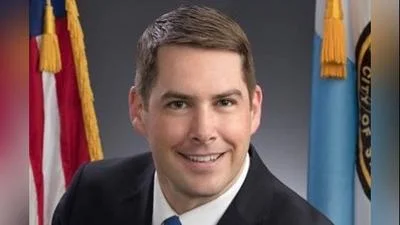Chancellor Kent Syverud | Syracuse University
Chancellor Kent Syverud | Syracuse University
Retired Air Force Special Tactics Officer and ROTC Alum Jeff Wilkinson ’89 Shares Lessons in Leadership and Preparation
Sep 9, 2024
Across the U.S. Department of Defense, there are approximately 650 commissioned flag officers, known as generals or admirals. Achieving this rank is a testament to a service member’s dedication, knowledge, leadership, and ability to effect change.
For retired U.S. Air Force (USAF) Brigadier General Jeff Wilkinson ’89, the path to becoming a flag officer—and the first-ever combat rescue officer to be promoted to the rank of general across the USAF—began at Syracuse University as an Air Force ROTC cadet.
Wilkinson, who served primarily in Air Force Special Tactics, didn’t initially see himself rising through the ranks. However, a call to service has guided him throughout his career.
“Growing up, I was interested in the outdoors, adventures as a Boy Scout, military air shows, museums and that sort of thing. I got serious in high school while figuring out how to pay for school and what I wanted to do,” says Wilkinson, a Buffalo, New York native who was drawn to Syracuse University through his passion for music and playing the saxophone.
“I started pursuing scholarships. I applied for and received an Air Force scholarship and decided I wanted to be an officer and lead. It was a pathway that allowed me to attend Syracuse and be part of its excellent programs,” Wilkinson says.
Music played a significant role in attracting Wilkinson to Syracuse, but his undergraduate studies in mathematics and military science delivered opportunities that laid the foundation for his career. Following the loss of his Zeta Psi fraternity brother Alex Lowenstein along with 34 fellow students during the 1988 Pan Am Flight 103 bombing over Lockerbie, Scotland, Wilkinson decided he wanted to make a difference fighting international terrorism.
One of his ROTC instructors suggested he consider the Air Force’s special operations career field. Unlike many military occupations available to him upon graduation, Special Tactics required an application and passing qualifications.
“There are a limited number of officers in the field, so you have to apply for it, and it’s really hard to make it through the training pipeline,” Wilkinson says. “The washout rate is high. My class started with about 68 people, and six of us graduated. It’s a hard path but it’s where I was meant to be.”
The Air Force’s Special Tactics community is primarily composed of two roles: Combat Control Team (CCT) and Pararescue (PJ). Combat controllers provide global reach by opening remote austere air hubs in hostile territory along with strike capabilities delivering airpower on enemy positions while pararescuemen offer critical medical care while embedded with other units or by entering contested areas to rescue downed aircrew or wounded service members.
Over 32 years in the Air Force, Wilkinson served on active duty, in the reserve, and in the Kentucky Air National Guard as a Special Tactics officer. His service took him across the nation and around the world supporting operations like Operation Uphold Democracy in Haiti, Operation Enduring Freedom in Afghanistan, and Operation Iraqi Freedom in Iraq.
As he rose from second lieutenant to brigadier general, Wilkinson credits his success to the fundamentals he learned as an ROTC cadet. In spring 2024 he returned to Syracuse University to share his career insights with ROTC cadets of Detachment 535 before their graduation. As guest speaker he shared three key takeaways:
1. Trust in your training.
Wilkinson shared the story of U.S. Air Force Master Sgt. Bart Decker his combat control instructor who later deployed to Afghanistan as part of initial response to Sept. 11 attacks. The Special Forces detachments initially deployed required immense flexibility even adjusting traveling on horseback through rugged terrain—a skill long forgotten since early 1940s military tactics.
“The foundations and processes started here in ROTC prepare you lead unimaginable scenarios With positive attitude disciplined study agility thought you will succeed Agile thinking encouraged Air Force needed tomorrow’s wars” Wilkinson says
2 Seek advice from your subordinates thoughtful decisions
Wilkinson urged graduating cadets listen noncommissioned officers NCOs often train new officers field technical expertise He recalled advice senior officer still considers among best received He told me new rank certifications gave authority make decisions wrong could result injury death my Airmen minimum violations could land jail So better thoughtful decisions listen NCOs Seek experience perspective making decisions” Wilkinson says
3 Don’t wait make difference
Wilkinson now senior aerospace science instructor high school Junior ROTC detachment Summerville South Carolina extensive experience mentoring future leaders urged young leaders address issues find solutions moment arises recounted time leading pararescuemen humanitarian response deployment Haiti after earthquake team highly trained specialists took four five hours search site nearby FEMA team rescue dogs cleared area minutes With persistence our team established first rescue dog combat capability entire Department Defense assigned Kentucky Air National Guard capability came existence thanks earnest efforts dedicated staff sergeant flight commander now available broader Air Force” Wilkinson says
Syracuse University list military-connected alumni reach prestigious flag officer ranks continues grow showcasing dedication service university instills ROTC cadets As Wilkinson says however not rank matters end willingness step forward serve You stand forefront our citizens willing part something greater yourself American way life American freedoms valuable There always greater opportunities people produce results” says For more information University commitment preparing tomorrow military leaders visit Office Veteran Military Affairs website learn opportunities available through ROTC





 Alerts Sign-up
Alerts Sign-up